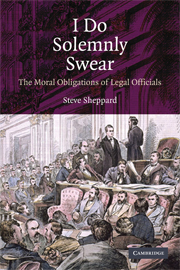Book contents
- Frontmatter
- Contents
- Preface: Moral Officials, Retail Justice, and Three Caveats
- Acknowledgments
- Introduction: Seven Questions about What Is Fit for an Official to Do
- 1 Law and Office
- 2 The Stakes: The Interests of Others in Official Actions
- 3 Officials' Obligations Arise from More Than the Law Alone
- 4 The Moral Obligations of Legal Officials
- 5 Patterns of Relationship between Legal and Moral Obligations
- 6 Breaching Obligations
- 7 Tools for the Trade: Maxims and Fallacies
- Epilogue: What the Official Ought to Do: Law and Justice
- Appendix: Taxonomy of Headings: The Lawes and Libertyes of Massachusetts (Discussed in Chapter 1)
- Index
- References
4 - The Moral Obligations of Legal Officials
Published online by Cambridge University Press: 05 June 2012
- Frontmatter
- Contents
- Preface: Moral Officials, Retail Justice, and Three Caveats
- Acknowledgments
- Introduction: Seven Questions about What Is Fit for an Official to Do
- 1 Law and Office
- 2 The Stakes: The Interests of Others in Official Actions
- 3 Officials' Obligations Arise from More Than the Law Alone
- 4 The Moral Obligations of Legal Officials
- 5 Patterns of Relationship between Legal and Moral Obligations
- 6 Breaching Obligations
- 7 Tools for the Trade: Maxims and Fallacies
- Epilogue: What the Official Ought to Do: Law and Justice
- Appendix: Taxonomy of Headings: The Lawes and Libertyes of Massachusetts (Discussed in Chapter 1)
- Index
- References
Summary
The first office of justice is to keep one man from doing harm to another, unless provoked by wrong; and the next is to lead men to use common possessions for the common interests, private property for their own.…
The foundation of justice, moreover, is good faith; – that is, truth and fidelity to promises and agreements.…There are, on the other hand, two kinds of injustice – the one, on the part of those who inflict wrong, the other on the part of those who, when they can, do not shield from wrong those upon whom it is being inflicted.
Cicero, On Duties, Book I, Chapter VII.If one accepts that officials have obligations to use their discretion according to principles that arise from anything other than the law, then the content of those principles must be quite important. Indeed, you might accept the idea that there are principles that a legal official must follow, even if you rejected all of the arguments to this point in this book.
Attempting to sort out such principles is complicated. It is hard sometimes to know which among the voices clamoring for influence that one must hear. And, even when an individual has a fairly clear view of what must be done, if the individual also has a healthy sense of skepticism, there is the nagging concern that such seemingly clear views might yet be wrong.
- Type
- Chapter
- Information
- I Do Solemnly SwearThe Moral Obligations of Legal Officials, pp. 124 - 178Publisher: Cambridge University PressPrint publication year: 2009



